Dear Zazie,
Here is today’s Lovers’ Chronicle from Mac Tag.
Rhett
The Lovers’ Chronicle
the line was first used in my 2018 poem,
inspired by somethin’ Swinburne wrote no doubt
“He was a drama queen”
had to be, he reveled
in shockin’ his
Victorian audiences
“With his hair or poetry”
ha, both
maybe that explains
my early dramatic poems
i am not that, so i became that
“Could be”
anyhow i came slowly
to believe less is more
in writin’ and perhaps
to know this is what i want
© copyright 2023 mac tag/cowboycoleridge all rights reserved
another for you, how could i refuse; save is a word thrown around too much, but it is a certainty that you were the highlight of those days; wait, readin’ that now feels inadequate; you were those days; your laugh, your eyes, you tried to tell me there was hope and i said not but there it was, everyday in you
© copyright 2022 mac tag/cowboycoleridge all rights reserved
© copyright 2021 mac tag/cowboy coleridge all rights reserved
we cannot forget
© copyright 2020 mac tag/cowboy coleridge all rights reserved
“Wish you were here
to calm my fears.”
i cannot imagine,
higher purpose
hey, an idea
beautiful night
on the High Plains
come, let us put
the world on hold
get a bottle of wine
and drive out
to a secluded spot
and watch the sun set
and stay
till the stars
fill the sky
then later,
back home,
we can open
all the windows
and lay in bed
and know
we cannot forget
© copyright 2019 mac tag/cowboy coleridge all rights reserved
before there came
to the makin’,
before the vision
time with tears,
grief, self inflicted
pleasure with pain
comin’ slowly
remembrance fallen
and madness risen
a strength born
belief that endures
from you
do you know,
comin’ slowly,
you saved me
and i miss you
© copyright 2018 mac tag/cowboy coleridge all rights reserved
been keepin’ busy since then
with work and writin’
but i realize how long it has been
and i wonder…
if i could have told you,
would it have mattered
literature
and libretti
abound with tales
of those who die for love
or the lack thereof
whether it comes
or not,
i am ready
© copyright 2016 Mac Tag all rights reserved
Today is the birthday of Jean-Honoré Fragonard (Grasse, France 5 April 1732 – 22 August 1806 Paris); painter and printmaker whose late Rococo manner was distinguished by remarkable facility, exuberance, and hedonism. One of the most prolific artists active in the last decades of the Ancien Régime, Fragonard produced more than 550 paintings (not counting drawings and etchings), of which only five are dated. Among his most popular works are genre paintings conveying an atmosphere of intimacy and veiled eroticism.
Gallery
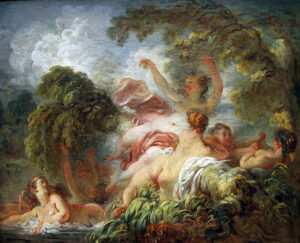
Les Baigneuses (1765)
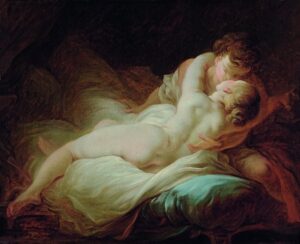
L’Instant désiré 1770
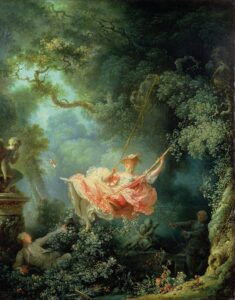
Les Hasards heureux de l’escarpolette
Today is the birthday of Nadar (Gaspard-Félix Tournachon; Paris 5 April 1820 – 20 March 1910 Paris); photographer, caricaturist, journalist, novelist, balloonist, and proponent of heavier-than-air flight. In 1858, he became the first person to take aerial photographs.
Photographic portraits by Nadar are held by many of the great national collections of photographs. His son, Paul Nadar (1856–1939), continued the studio after his death. He was buried in Père Lachaise Cemetery in Paris.
Gallery
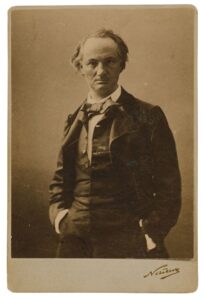
Charles Baudelaire
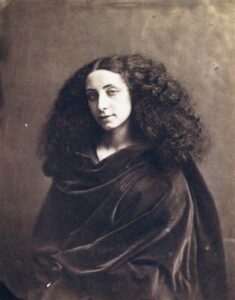
Jeanne Duval
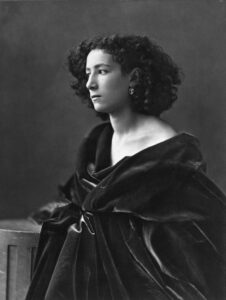
Sarah Bernhardt
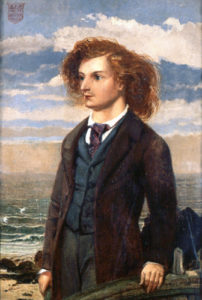
Today is the birthday of Algernon Charles Swinburne (London 5 April 1837 – 10 April 1909 London); poet, playwright, novelist, and critic. He wrote several novels and collections of poetry such as Poems and Ballads, and contributed to the famous Eleventh Edition of the Encyclopædia Britannica. His family was part of the aristocracy so he never had to work for a living. Instead, he worked on cultivating an outrageous image. He was small of stature, with vibrant and untamed red hair, and he drank to excess, and sometimes screamed his poetry aloud. He wrote poems calculated to shock Victorian audiences: verses about sex and sadomasochism and vampires. For many years, he was trapped in a cycle of overindulgence, collapse, and recovery.
Swinburne was an alcoholic and algolagniac and highly excitable. He liked to be flogged. His health suffered, and in 1879 at the age of 42, he was taken into care by his friend, Theodore Watts-Dunton, who looked after him for the rest of his life at The Pines, 11 Putney Hill, Putney. Watts-Dunton took him to the lost town of Dunwich, on the Suffolk coast, on several occasions in the 1870s.
In Watts-Dunton’s care Swinburne lost his youthful rebelliousness and developed into a figure of social respectability. It was said of Watts-Dunton that he saved the man and killed the poet. Swinburne died at the Pines on 10 April 1909, at the age of 72, and was buried at St. Boniface Church, Bonchurch on the Isle of Wight.
Atalanta in Calydon (1865)
There came to the making of man
Time with a gift of tears,
Grief with a glass that ran,
Pleasure with pain for leaven,
Summer with flowers that fell,
Remembrance fallen from heaven,
And Madness risen from hell,
Strength without hands to smite,
Love that endures for a breath;
Night, the shadow of light,
And Life, the shadow of death.
-
- Second chorus, lines 1-12.
Forget that I remember
And dream that I forget.
Time found our tired love sleeping,
And kissed away his breath;
But what should we do weeping,
Though light love sleep to death?
We have drained his lips at leisure,
Till there’s not left to drain
A single sob of pleasure,
A single pulse of pain.
Dream that the lips once breathless
Might quicken if they would;
Say that the soul is deathless;
Dream that the gods are good;
Say March may wed September,
And time divorce regret;
But not that you remember,
And not that I forget.
- “Rococo”, lines 15-32.
We had stood as the sure stars stand, and moved
As the moon moves, loving the world; and seen
Grief collapse as a thing disproved,
Death consume as a thing unclean.
Twain halves of a perfect heart, made fast
Soul to soul while the years fell past;
Had you loved me once, as you have not loved;
Had the chance been with us that has not been.
I have put my days and dreams out of mind,
Days that are over, dreams that are done.
Though we seek life through, we shall surely find
There is none of them clear to us now, not one.
- I remember the way we parted,
The day and the way we met;
You hoped we were both broken-hearted
And knew we should both forget.- An Interlude.
- And the best and the worst of this is
That neither is most to blame,
If you have forgotten my kisses
And I have forgotten your name.- An Interlude.
| Jules Dupré | |
|---|---|

Self-portrait painted in 1853
|
|
Today is the birthday of Jules Dupré (Nantes, France; April 5, 1811 – October 6, 1889); painter, one of the chief members of the Barbizon school of landscape painters. If Corot stands for the lyric and Rousseau for the epic aspect of the poetry of nature, Dupré is the exponent of his tragic and dramatic aspects.
Dupré exhibited first at the Salon in 1831, and three years later was awarded a second-class medal. In the same year he came to England. From then on he learned how to express movement in nature; and the districts around Southampton and Plymouth, with its wide, unbroken expanses of water, sky and ground, gave him good opportunities for studying the tempestuous motion of storm-clouds and the movement of foliage driven by the wind. He was named an Officer of the French Légion d’honneur in 1848.
Dupré’s colour is sonorous and resonant. He showed preference for using dramatic sunset effects and stormy skies and seas as the subjects of his paintings. Late in life he changed his style and gained appreciably in largeness of handling and arrived at greater simplicity in his colour harmonies. Among his chief works are the Morning and Evening at the Louvre, and the early Crossing the Bridgein the Wallace Collection.
Gallery
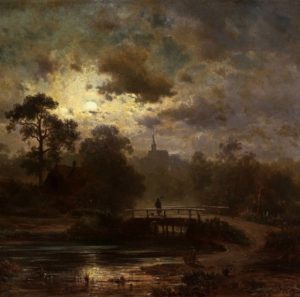
Paysage au clair de lune
-
 Coucher du soleil
Coucher du soleil -
 Le calme avant la tempête
Le calme avant la tempête -
 Livraison dans une brise
Livraison dans une brise -
 Mer agitée (c.1870)
Mer agitée (c.1870) -
 Une brise raide
Une brise raide -
 Barges fuyant devant la tempête
Barges fuyant devant la tempête -
 At Sea
At Sea -
 Le cap
Le cap -
 Paysage marin (1870)
Paysage marin (1870) -
 Sunset on the Coast
Sunset on the Coast
-
Mac Tag

No Comments on "The Lovers’ Chronicle 5 April – comin’ slowly – art by Jean-Honoré Fragonard & Jules Dupré – photography by Nadar – verse by Algernon Charles Swinburne"